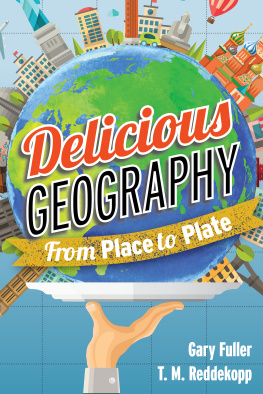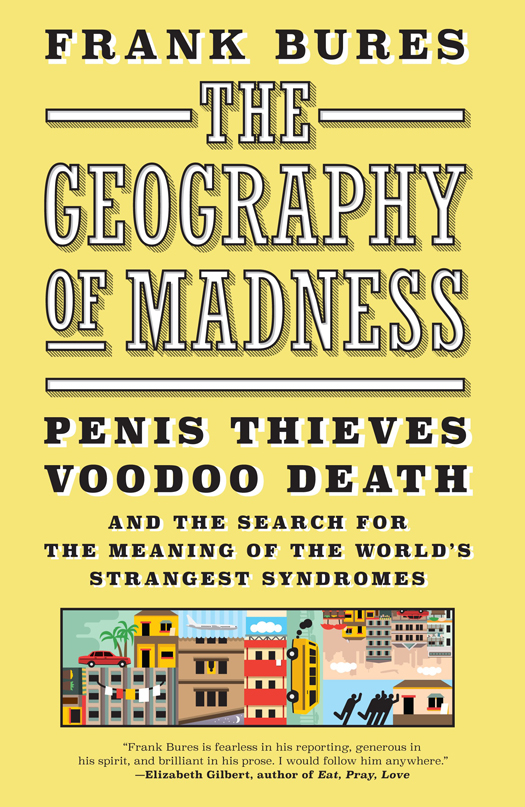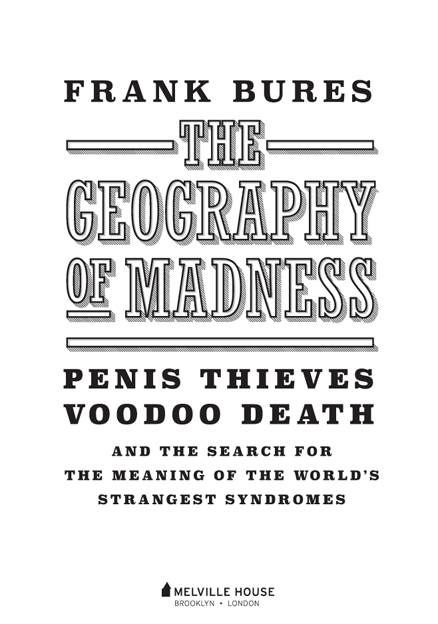THE GEOGRAPHY OF MADNESS
Copyright 2016 by Frank Bures
First Melville House Printing: April 2016
Melville House Publishing
46 John Street
Brooklyn, NY 11201
and
8 Blackstock Mews
Islington
London N4 2BT
mhpbooks.com facebook.com/mhpbooks @melvillehouse
Ebook ISBN: 978-1-61219-373-1
A catalog record for this book is available from the Library of Congress
v3.1
For Bridgit, for everything
Heaven have mercy on us allPresbyterians and Pagans alikefor we are all somehow dreadfully cracked about the head, and sadly need mending.
HERMAN MELVILLE , Moby-Dick
CONTENTS
INTRODUCTION
In 1990, I left a small town in the Midwest and went to Italy to spend a year as an exchange student. What I encountered there was a shock, and what followed was one of the most difficult years of my life. When I got home, I was not the same.
How was that possible? How could moving from one place, from one language, from one culture to another change who you are? Yet it did. After one short year immersed in Italian society, I felt like a different person, and I was disturbed by the depth of this change. I didnt feel completely American any more, but neither did I feel Italian. I had, it seemed, left something behind.
What I didnt know at the time was that that year abroad marked the beginning of a questone that would take years to understand, let alone complete. The Geography of Madness is the story of that search, which would take me to places Id never dreamed Id goto Nigeria, Thailand, Borneo, Singapore, Hong Kong, China, and elsewhere. In those places I found wandering fox ghosts and lizards that crawl under your skin, poison pork, and poisoned minds. I also came to see how our ideas can kill us, how our beliefs can save us, and how these things quietly determine the course of our lives.
They can also cause your penis to disappear. That was what I found when I went to Nigeria to investigate the phenomenon of magical penis theft, where people felt that their genitals had disappearedthat theyd been stolen away through sorcery. Magical penis theft was known in the medical literature as koro, and was considered a culture-bound syndrome. The victim feels his (or occasionally her) genitals being sucked into his (or her) body. If this transpires, death will ensue.
But even as I found myself fascinated by the cases of these thefts, another question grew in my mind: What would it feel like to live in a world where such a thing were possiblewhere at any minute your penis could be whisked away? This question would lead me, in turn, to the deeper questions underlying it. Namely: What is culture? What is it made of? And how are we bound to it?
For much of the twentieth century, this question was fiercely debated, but in the 1990sthe era of globalizationit was abandoned by serious thinkers. Instead, they argued that culture could not be defined because it was everything that we do. Meanwhile, others pointed out that if culture was everything, then it was also nothing. In the end, the word came to seem like a hopeless paradox, and the world simply moved on.
But I couldnt move on. I knew that culture wasnt nothing. I knew this because I had looked into the eyes of Starrys Obazi, whose penis had been stolen on a street corner in Lagos. I knew it because I had felt cultures power myself, and had been trying to understand it ever since.
Now, after years of asking questions, after traveling through these places, I believe I have the answers I sought, not only about what culture is, but also about how it makes us sick and well, sane and insane; how it gives us hope and takes it away; how it tells us who we are and who we are not; how it shapes us and how we shape it.
Much of what youll encounter in the pages that follow will seem impossible, or at least hard to believe, but this is a work of nonfiction. All conversations and events here took place, and are reproduced as faithfully as possible. Some grammar has been corrected for reading purposes, but this was checked with the speakers whenever they could be reached. More to the point, the worlds Ive tried to convey here do exist and are real to the people in them. As you read on, and as we travel together, I hope they will become more so to you as well, and that the lines between the real and the imagined, between the familiar and the foreign, begin to blur. By then, I hope youll come to see the part we all play in creating worlds that look strange from outside but that make perfect sense from within, and how the strands that hold those worlds together are the same threads that run through our lives, and that hold us together too.
1
THE CASE OF THE MISSING MANHOOD
The sun was high and the day was already hot when our car rolled into Alagbado, a dusty, run-down town on the far edge of Lagos, the Nigerian mega-city where a young man named Wasiu Karimu was reported to live. His penis had been stolen.
A few days earlier, his name had appeared in the paper: The headline read: COURT REMANDS MAN OVER FALSE ALARM ON GENITAL ORGAN DISAPPEARANCE . It said that a certain Wasiu Karimu was on a bus when he was said to have let out a strident cry, claiming that his genital organ had disappeared. He immediately grabbed [Funmi] Bello, who was seated next to him, and shouted that the woman should restore his stolen organ.
The two of them got off the bus, and a crowd of miscreants swarmed around Bello, ready to kill her. But a passing police patrol intervened, stopped them from lynching her, and escorted the two to the police station. There Karimu told the commissioner his organ was returning gradually.
The paper gave the address where Wasiu Karimu lived, so I decided to try to find out what exactly had transpired in his pants. A friend named Toni Kan had lent me his car, and had asked Akeem, his mechanic and sometimes driver, to take me out to the place.
We drove past clapboard shacks and little restaurants, through huge muddy pools, past people watching us from doorways, until we came to the address in the paper. Chickens and goats scattered in front of our car, which said PRESS on the windshield. (Toni freelanced for a few Lagos papers and magazines.)
Wasiu Karimus house was an ample, two-story affair with a little shop next to it. We got out and asked a girl working inside if he lived there.
Yes, she said, but he is not around.
Akeem went into the yard of the house, and a woman jumped in front of him. She said she was Wasius mother and began yelling at Akeem to get out of the yard. He retreated to the car, and for a few minutes, we stood in the middle of the road, in the sun, waiting for Wasiu Karimu to show up. But after about twenty minutes, several young men came around the corner and took up posts around the house. A couple of them were holding long sticks.
Akeem turned to me. Local Area Boys, he said.
In Lagos, the Area Boys were thugsa law unto themselves. They had multiplied after the military dictatorship fell in 1998, seeding a new kind of terror throughout the city. These boys had an ugly swagger. I could see sweat start to drip down Akeems head. He turned to me.
Let us go, he said.
Wait a minute, I said. Wed come a long wayin fact, I had come all the way from America just for this, and this could be my only chance to talk to someone whose penis had actually been stolen. So I made us wait. I figured we werent doing any harmI just wanted to ask a few questions. I walked over to the shop next to Wasiu Karimus house and bought a bottle of coke.









